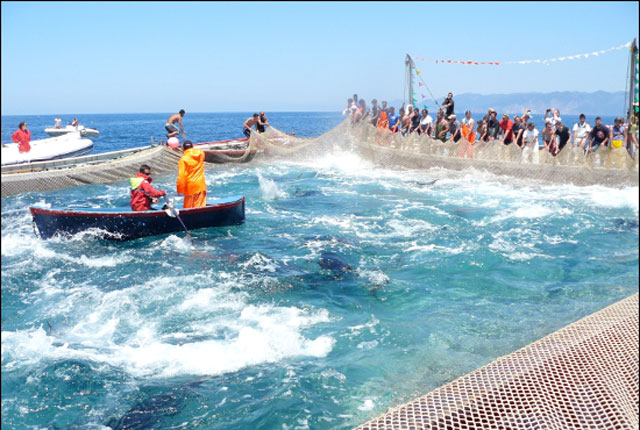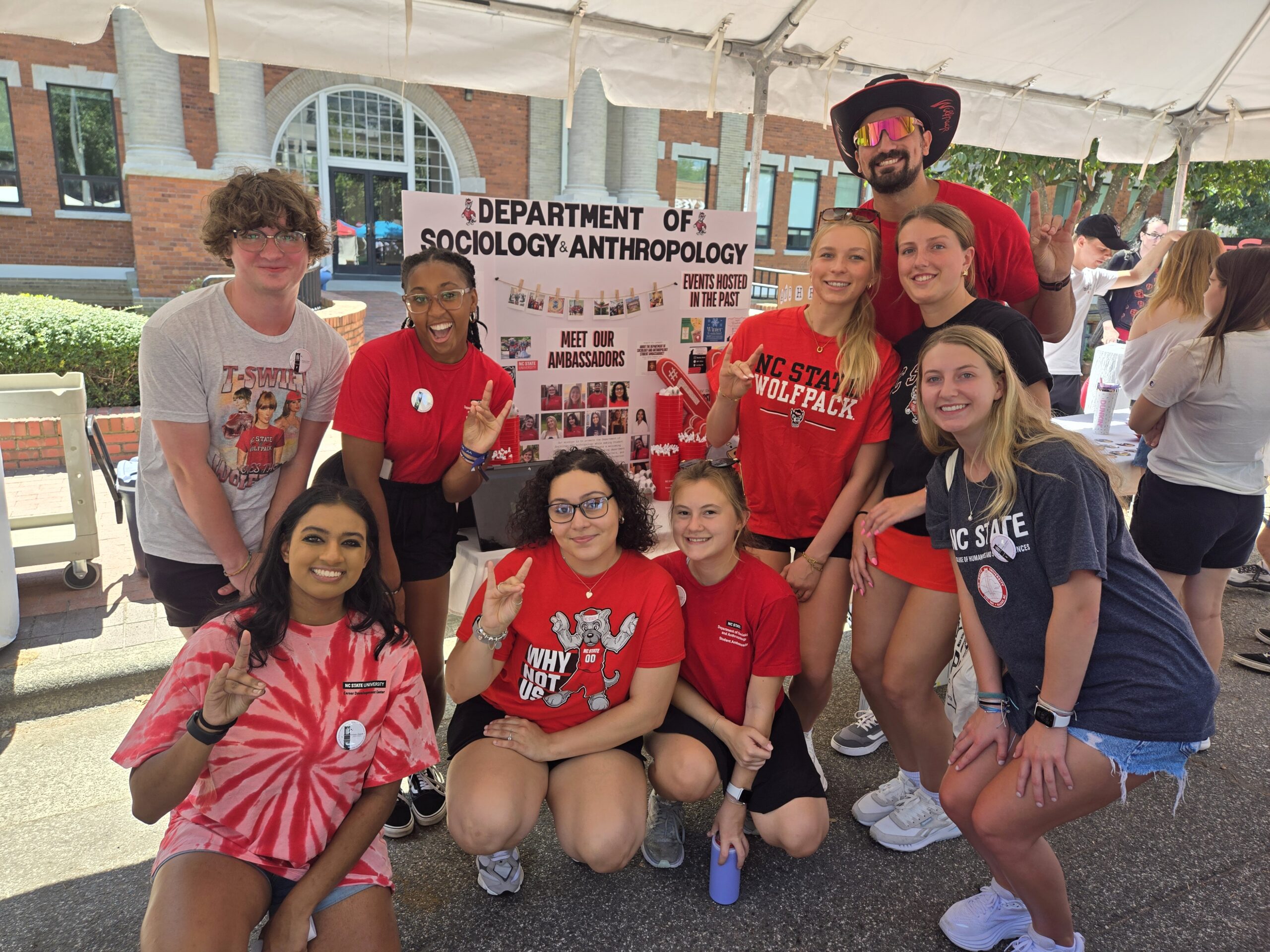On Fisheries, Society and Sustainability


Stefano Longo is an environmental sociologist and assistant professor of sociology at NC State. His work examines the links between society, marine ecosystems, and global food systems with a particular focus on fisheries. He’s also co-author of The Tragedy of the Commodity: Oceans, Fisheries, and Aquaculture (June 2015, Rutgers University Press).
NC State’s research blog, The Abstract, posted this interview about Longo’s work and what it can tell us about addressing issues related to the sustainable use of natural resources.
The Abstract: You specialize in environmental sociology – what exactly does that mean?
Stefano Longo: Environmental sociologists are interested in studying the relationships between social systems and ecological systems. This can be examined in many ways including, for example, developing research that studies beliefs and attitudes about the environment, or political concerns and social movements associated with the environment.
In addition, environmental sociology has incorporated biophysical factors into analyses, assessing how humans affect the environment or how environmental conditions affect humans, where actual environment measures (for example, carbon dioxide emissions) or ecological dynamics are analyzed along with measures of human social factors. Both of these approaches have been applied to try and better understand the ways that social systems are interacting with ecological systems historically and in the present.
TA: What drew you to environmental sociology in the first place?

Longo: Initially, I was very interested in understanding the ways that food production systems are affecting environmental conditions, and what a sustainable food production system might socially require. What I mean is, our current food system produces lots of food, but the environmental consequences are severe. How might we develop a food production system that is productive and ecologically sound? More than this, how do we develop a food system where everyone has enough healthy food to eat?
All of this required that I start thinking about production, consumption, and distribution of food, together with environmental sustainability, social justice, and human health concerns. In considering these issues, it became apparent to me that sociology was the best way to develop such a comprehensive analysis, and environmental sociology was the key for incorporating the ecological components.
TA: A lot of your work focuses on the nexus of society and fisheries. What made you decide to focus on fish and commercial fishing?
Longo: During my studies in environmental sociology and food systems I decided to focus my research on a particular fishing system that I had an interest in studying for many years. I began a research project that examined the bluefin tuna fishery in the Mediterranean Sea. I thought this was a fascinating case study, considering my interests. Also, my family origins are in Sicily, and this was a fishery that was a very significant part of community life in the region that I had been visiting since I was young child. A particular fishing system had been developed in the Mediterranean. In Italian it is called la tonnara. It is a passive trap fishing technology. This was operational for several centuries, but had entered a period of decline beginning in the late twentieth century. Once I initiated this study, I became increasingly interested in issues related to fishing and ocean systems. Also, I began to realize how significant these issues are, socially and ecologically, and I have continued to expand my studies.
TA: You are a co-author of The Tragedy of the Commodity: Oceans, Fisheries, and Aquaculture, which argues that turning ocean resources (like fish) into commodities has led to the depletion of fisheries and the development of environmentally suspect means of aquaculture. People have been fishing for a livelihood for thousands of years – when did fish become a “commodity,” and what does that mean?
Longo: It is difficult to provide an exact time when fish became commodities. We might say that, to some degree, at least since the Greek era, but likely even before then. But this is a different question from what we are concerned with in our book. We are asking: when did fish (specifically salmon and bluefin tuna, since those are cases we focus on) generally become a commodity? That is, when did the commodification of these fish become the leading way that we acquired them, when did these processes become globalized, and what have been the implications?
This means that these fish became an item that was mainly exchanged through sale on a market, and the primary purpose of this was financial gain or profit. The key word here is primary, because this is not saying that there are not many reasons why fish might be sold on a global market, like for example, providing access to a source of protein for people in a centralized manner. This is another reason. But it is a commodity when its principle objective is to sell it for financial gain. Without this central motivation, it is not a commodity. This was not a widespread, everyday matter until rather recently in human history. The commodification of fish becomes commonplace only a few centuries ago, and we can say pervasive and often the sole mechanism for acquiring fish for most people (particularly in the global North) during the twentieth century, but it really depends on place and species. Even then, people still capture fish for their own consumption, or not in a commodified manner, but this is not the common mode of access in most parts of the world. It gets more a bit complicated, but that is the short answer.
In the book, we focus on the social processes that are associated with the global commodification of bluefin tuna and salmon. We develop historical analyses of the transformation in production, consumption, and distribution systems and consider the social and ecological implications of these changes.
TA: Why is it bad to treat fish as a commodity?
Longo: It is not bad to treat fish as a commodity, per se. It does, however, tend to have certain social and ecological outcomes, and this is particularly true when they become widespread commodities traded on a global scale.

Global commodification is commonly associated with large-scale fishing technologies (or sometimes intensive aquaculture), and mass production and consumption. Some people might consider these positive developments. For example, executives at major seafood trading companies would see tremendous opportunities. However, the social and ecological costs of the benefits that accrue to some individuals or groups might be very steep. It could even mean that the short-term gains would bring about the eventual collapse of a fishery. For the communities and groups that are employed by the fishery, the results can be mixed. Early in the process, some would gain and some would lose. In the big picture, they could all lose, particularly if the fishery collapses. Further, there can be serious and complex ecological costs related to ecosystem disruptions when large-scale commercial fishing efforts, associated with global commodification, undermine fish populations – the total implications of which are still very difficult to comprehend.
Nevertheless, we can say with some confidence that when humans disrupt marine ecosystems to the point of ecological disorganization, it will very likely have a negative impact on human well-being. This might include loss of work, but also the destruction of a source of food. Further, marine ecosystems have intrinsic value, and destruction that can result from commercial gain is a serious problem that we need to face.
TA: Does your analysis in the book offer possible solutions for how we can continue to eat seafood without causing irreparable harm to fish populations and ecosystems?
Longo: Yes, we offer some ideas for what our research tells us could improve the current social and ecological concerns associated with fish production and consumption. As environmental sociologists, we locate the problems largely in the system of production, which is different than many common views on this. That is, consumer choices and decisions are important, but contrary to popular opinion, we do not see that these individual level choices are significant mechanisms for addressing concerns such as overfishing and ecosystem degradation. We argue that larger transformations in our socio-ecological relationships are essential, especially in the socioeconomic system that serves as a background social condition and influences almost all aspects of society. This might include more localized production and consumption, but it also means that we have to radically rethink the ways in which we produce and distribute food. Furthermore, we will have to ask ourselves if we should regard food as a commodity or a human right? This is an important starting point for thinking about solutions.
TA: Do you think this analysis of ocean resources offers readers (or scholars) insights into other industries that draw on natural resources?
Longo: Indeed, the approach that we set forth in the book is applicable to other processes of natural resource extraction and environmental concerns such as climate change, or biodiversity loss, or deforestation. We call it the tragedy of the commodity and it is a play on the famous theory developed in the 1960s by Garrett Hardin, which he termed the tragedy of the commons.
Hardin’s description of resource over-exploitation became a leading theory in environmental and natural resource studies for explaining why depletion of natural resources occurs when the long-term social costs of environmental destruction can be very high. Hardin’s theory focuses on the problems associated with common property or “commons.” Generally, he argued that humans tend to over-exploit resources when they can; when they have access to it, and when they personally benefit from it. We suggest that Hardin’s theory is too simplistic and, importantly, not sociologically informed. We are not the first scholars to propose this. However, we provide an original alternative explanatory tool with the tragedy of the commodity framework, which can be applied to the environmental issues I mentioned, and to many others.
TA: What are future directions for your work on understanding the sociology of fisheries?
Longo: The work that I am developing now is associated with what I call marine sociology. This might seem like a strange term (even more so than environmental sociology). It is, in essence, an approach that emerges out of environmental sociology that is attempting to render marine issues more significant in sociological studies. It is an explicit effort to highlight the marine realm as a sociological subject. Of course, fishing systems are an important part of this, and this has attracted some attention from sociologists. However, many concerns associated with the oceans and related systems have been largely neglected.
Human societies have been central forces in the transformations that are occurring in marine systems, which have been well documented by natural scientists. Yet, sociologists have not fully integrated analyses of oceanic systems in the manner that is suggested by environmental sociology. That is, sociologically speaking, how are we affecting them and how are they affecting society? There is a tremendous amount of work to be done here, and, I think, increasingly important in light of the massive ecological changes that are transpiring in the World Ocean.
By Matt Shipman
This Q&A first ran in NC State’s research blog, The Abstract.
- Categories:


